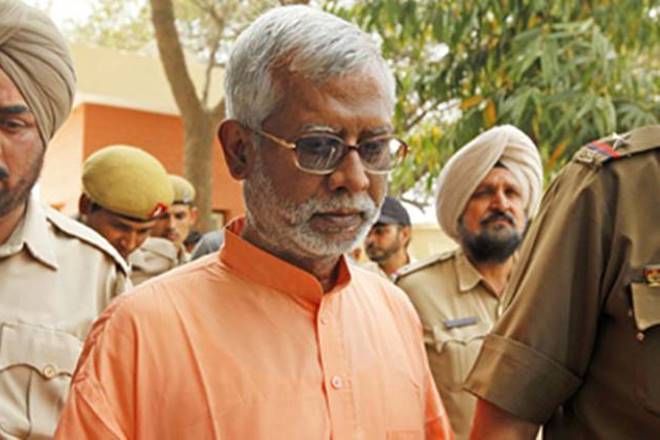NEW DELHI (Reuters) – An Indian court on Wednesday acquitted four Hindu men accused of bombing a train between India and Pakistan in 2007 that killed 68 people, mostly Pakistanis, citing a lack of evidence, defence lawyers said.
Pakistan’s acting foreign secretary described the ruling as a “travesty of justice”.
The ruling comes weeks after a sharp escalation in tensions between India and Pakistan after a suicide car bomb in Kashmir killed 40 Indian paramilitary police. Pakistan-based militant group Jaish-e-Mohammed claimed responsibility for the attack.
The court in Haryana gave its verdict after dismissing a petition filed last week by the daughter of a Pakistani victim who wanted to get her statement recorded as a witness.
“Prosecution has failed to prove the case so the court acquitted all of them,” lawyer Mukesh Garg told reporters outside the court. “The court first rejected the application from a Pakistani lady.”
One of those declared not guilty is Swami Aseemanand, a self-styled Hindu holy man and former member of the nationalist organisation Rashtriya Swayamsevak Sangh, the parent of India’s ruling party.
Aseemanand was jailed in 2010 after admitting his involvement in the attack on the train near Panipat, a city about 100 km (62 miles) north of Delhi. He later said he had been tortured to give a false statement.
Two coaches of the Samjhauta Express, a bi-weekly train that runs between New Delhi and Lahore in Pakistan, caught fire late on Feb. 19, 2007, after two improvised explosive devices exploded, according to a charge-sheet filed by India’s National Investigation Agency (NIA) in 2013.
In all, the NIA had accused eight men of conducting what it described as a “dreadful terrorist act”. It said the group had been “angry with attacks on Hindu temples by jihadi terrorist activities”. One of the accused was murdered in December 2007 and three others absconded from justice.
Pakistan’s acting foreign secretary summoned the Indian high commissioner in Islamabad on Wednesday to protest the decision.
“Pakistan had consistently raised the lack of progress and the subsequent, concerted attempts by India to exonerate the perpetrators of this heinous terrorist act,” the Pakistani foreign office said in a statement.
“The acquittal of the accused today, 11 years after the heinous Samjhauta Terror Attacks, makes a travesty of justice and exposes the sham credibility of the Indian Courts.”
Pakistan earlier questioned what it called India’s lack of action against the accused. India had responded by accusing Pakistan of failing to act against militant groups behind attacks in Mumbai in 2008, in which 166 people were killed.
Asaduddin Owaisi, an Indian lawmaker and prominent Muslim leader, criticised Wednesday’s verdict.
“68 dead and nothing to account for them, nothing to say that justice has been done,” he said in a tweet.
Additional reporting by Devjyot Ghoshal and Saad Sayeed; Editing by Krishna N. Das and Hugh Lawson

Acquitted in Mecca Masjid Blast Also
Swami Aseemanand, main accused in the Mecca Masjid blast case of 2007, has been acquitted by a special NIA court in Hyderabad. The blast at the historic Mecca Masjid of Hyderabad during Friday prayers on May 18, 2007 had claimed nine lives and injured 58 people. The court acquitted Aseemanand for want of evidence.
According to Arvind J Bosmia, an Ahmedabad-based journalist who was a friend of Aseemanand for 11 years, the real name of Aseemanand is Jitendranath Chatterjee. He was born at Karmapur of Hooghly district in West Bengal. Bosmia described Aseemanand in an article on rediff.com in January 2011 as “A man of deep passion and relentless commitment to the tribal welfare, he displayed no interest in anything which had no connection with the tribal world.”
Aseemanand is also referred to as Nabakumar Sarkar alias Ramdas of Gujarat.
Reports say that Asseemanad was initially attracted to teachings of Swami Vivekananda and later got inclined to the Rashtriya Swayamsevak Sangh (RSS). He had worked for several years with RSS’ Adivasi Kalyan Ashram (VKA) in Andaman and Nicobar island and other tribal areas. In 2005, the RSS had awarded Aseemanad with “Guruji Samman” on the occasion of the birth centenary of MS Golwalkar.
Assemanand was named in several blast cases including Samjhauta Express (February 2007), Hyderabad Mecca Masjid (May 2007), Ajmer Dargah (October 2007). He was also accused in the two attacks in Malegaon (September 2006 and September 2008). All of these blast incidents took a total of 119 lives.
In the Mecca blast case, only five people – Devendra Gupta, Lokesh Sharma, Swami Aseemanand alias Naba Kumar Sarkar, Bharat Mohanlal Rateshwar alias Bharat Bhai and Rajendra Chowdhary – were arrested and faced trial. Two accused in the case – Sandeep V Dange and Ramchandra Kalsangra – were absconding while one Sunil Joshi was dead.
In March last year, Assemanand was granted bail in the Mecca Masjid blast case. He was arrested on 19 November 2010 from Haridwar and lodged in the Chanchalguda Central Prison after he was acquitted in the Ajmer blast case by a Jaipur court. The Indian Express reports that Aseemanand was arrested after he given a written declaration that he and several members of Abhinav Bharat had conspired and executed the blast at the Mecca Masjid.
The Mecca Masjid blast in Hyderabad was executed through a pipe bomb that ripped through the mosque. As many as eight people were kileld on the spot, while five other were killed when police opened fire to quell a mob. As many as 38 Muslim youth initially detailed on the suspicion that they were behind the planning and execution of the case.
The Hyderabad police had registered the first case at Hussaini Alam Police Station. The was, however, transferred to the CBI on 7 June 2007 and later to NIA on April 7, 2011.
The NIA has said it will examine the court judgment after getting a copy of the Mecca Masjid Blast case verdict and decide further course of action





























































